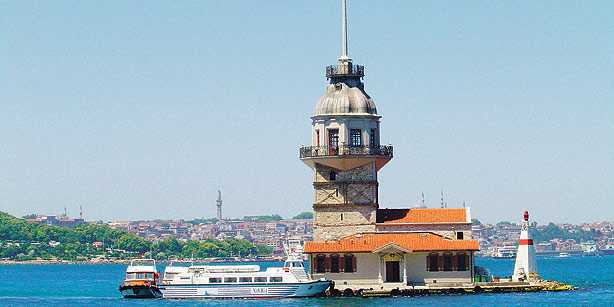By Dorian Jones
Istanbul
20 August 2008
Iranian President Mahmoud Ahmadinejad’s visit to Istanbul last week is seen as part of Ankara’s increasingly active role in the Middle East, after decades of passivity in the region. At the same time, some analysts say, Turkey’s ties to the West are deteriorating as its path to European Union membership continues to run into roadblocks. For VOA, Dorian Jones reports from Istanbul.
Turkey is now emerging as an important diplomatic actor in the Middle East. Over the past few years, Ankara has established close ties with Iran and Syria, with which it had tense relations during the 1980s and 1990s; adopted a more active approach toward the Palestinians’ grievances; and improved relations with the Arab world more broadly.
Iranian President Mahmoud Ahmedinejad (L) and his Turkish counterpart Abdullah Gul in Istanbul, 14 Aug 2008
Analysts are saying Iranian President Mahmoud Ahmadinejad’s visit to Turkey further proves the ties between the two countries and the region are getting warmer.
But Gokhan Cetinsaya, a professor of international relations at Istanbul Technical University, says there is more behind the warming of relations. Ankara’s agenda, he says, is being dictated by the ruling Islamic-rooted Justice and development party, the AKP.
“According to AKP foreign policy doctrine, Turkey with it strategic depth, Turkey with its geographic depth, Turkey’s with its economic power, military power … should certainly play a leading role in the region including the Middle East. Turkey should play a part in Africa and should play a part in central Asia, the Balkans, etc. Turkey should become a global power in the long run,” Cetinsaya said.
The AKP’s agenda is in sharp contrast to recent administrations whose sole priority was joining the European Union. The founder of the secular Turkish Republic, Mustafa Kemal Ataturk pushed a policy of turning his country’s back on the east and orientating it towards Europe in his bid modernize Turkey.
Critics argue that Turkish officials’ frequent visits to Arab and African nations has given them little time to court Europe’s leaders in Turkey’s bid to join the European Union. In addition, Turkey’s relations with the United States have become increasingly strained, largely because of the U.S. invasion of Iraq.
As a result, Turkey is now in the unprecedented situation of having poor relations with the EU and the United States simultaneously – a position seen by some analysts as turning their backs on the West.
But, Akif Emre a columnist for the pro Islamic daily Yeni Safak, disagrees.
“Given a choice, Turkey would be more close with Russia, India and China. Even the Islamic world,” Emre said. “That doesn’t mean Turkey would break all relationships with the West. They are looking for some new power to balance [its] European Union relationship.”
The current holder of the EU presidency, French President Nicolas Sarkozy, was elected on a platform of opposing Turkey’s bid for EU membership. Such opposition has taken it toll on the Turkish public’s attitude toward Europe.
On the streets of Istanbul, this woman’s view is typical.
“They don’t want us, because [of] culture, religion, living style. It is all about us,” she said. “This shows prejudice to our country but I believe Turkey does not need the European Union to be a powerful or strong country.”
Recep Tayyip Erdogan (file)
Also contributing to the waning public support of EU membership are important domestic changes in Turkish society. The pro-Western elite that has shaped Turkish foreign policy since the end of World War II is gradually being replaced by a more conservative, more religious, and more nationalist elite that is suspicious of the West. This group has a more positive attitude toward Turkey’s Ottoman past. The ruling Islamist Justice and Development Party, or AKP, headed by Prime Minister Recep Tayyip Erdogan, has managed to tap into rising popular nationalism by fusing it with Islam.
But the AKP party has run into problems recently when it narrowly escaped being shut down by the country’s constitutional court last month on the charge of undermining the secular state. Since then, there has been a marked change in government policy towards the EU membership process. According to Sabiha Senyucel of the Turkish political think tank Tesev.
“If you want to save your self in the country then the EU is your only guarantee for you,” Senyucel said. “The AKP knows very well that, If they don’t get back track with the EU process, if they don’t continue their commitment with the EU process, they are going to lose their support from the intellectuals circles and from the business circles.”
Recent opinion poll numbers show there has been an upsurge in support of EU membership especially amongst government supporters. International relations expert Mensor Akgun says there is now understanding within the government that the process of EU membership is more important than the outcome.
“They may not want us , but that does not matter as long as we fulfill the necessary requirements,” Akgun said. “As long as we become a fully democratic country with all the human rights observed, then I don’t think it matters lot, whether EU accepts or not.”
Prime Minister Erdogan has pledged that he will re-energize his government’s efforts to join the EU. Honoring that promise is seen by critics as a crucial test of the government’s commitment to protect the secular state. Another test, analysts say, will be whether the AKP will again make Europe its diplomatic priority.
Source : Voice of America





